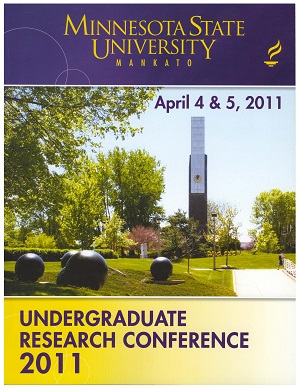Most People Use Only 10% of Their Brain Power: Misconception Identification & Revision in Psychology Students
Location
CSU 201
Start Date
4-4-2011 1:30 PM
End Date
4-4-2011 3:00 PM
Student's Major
Psychology
Student's College
Social and Behavioral Sciences
Mentor's Name
Karla Lassonde
Mentor's Department
Psychology
Mentor's College
Social and Behavioral Sciences
Description
Not surprising, information conveyed to the public as ―psychology‖ is not always grounded in scientific research and many times consists of thoughts of human behavior that have become ―rules of thumb.‖ We cannot fault the public for falling sway to popular psychological myths (e.g., Humans only use 10% of their brain power/subliminal messages persuade people to purchase products) but what about students studying psychology? Past research has indicated that these misconceptions are difficult to overcome, but it is possible through experience and learning in the field of psychology. Lilienfeld, Lynn, Ruscio, and Beyerstein (2010) recently identified common myths in the book, 50 Great Myths of Popular Psychology. The current study is the first in series dedicated to investigating the underlying cognitive processes that support misconception revision in psychology students. A questionnaire was developed and administered to 75 students taking psychology courses to validate the 50 myths identified by Lilienfeld et al. Results on the questionnaire indicated that the majority of students believed these myths to be true. Scores on the questionnaire differed as a function of number of classes taken, whether the participant was a major or non major, and year of study in the major. These results as well as plans for future research will be discussed.
Most People Use Only 10% of Their Brain Power: Misconception Identification & Revision in Psychology Students
CSU 201
Not surprising, information conveyed to the public as ―psychology‖ is not always grounded in scientific research and many times consists of thoughts of human behavior that have become ―rules of thumb.‖ We cannot fault the public for falling sway to popular psychological myths (e.g., Humans only use 10% of their brain power/subliminal messages persuade people to purchase products) but what about students studying psychology? Past research has indicated that these misconceptions are difficult to overcome, but it is possible through experience and learning in the field of psychology. Lilienfeld, Lynn, Ruscio, and Beyerstein (2010) recently identified common myths in the book, 50 Great Myths of Popular Psychology. The current study is the first in series dedicated to investigating the underlying cognitive processes that support misconception revision in psychology students. A questionnaire was developed and administered to 75 students taking psychology courses to validate the 50 myths identified by Lilienfeld et al. Results on the questionnaire indicated that the majority of students believed these myths to be true. Scores on the questionnaire differed as a function of number of classes taken, whether the participant was a major or non major, and year of study in the major. These results as well as plans for future research will be discussed.
Recommended Citation
Gilbert-Schwarck, Sarah and Samuel Erickson. "Most People Use Only 10% of Their Brain Power: Misconception Identification & Revision in Psychology Students." Undergraduate Research Symposium, Mankato, MN, April 4, 2011.
https://cornerstone.lib.mnsu.edu/urs/2011/oral-session-07/2




